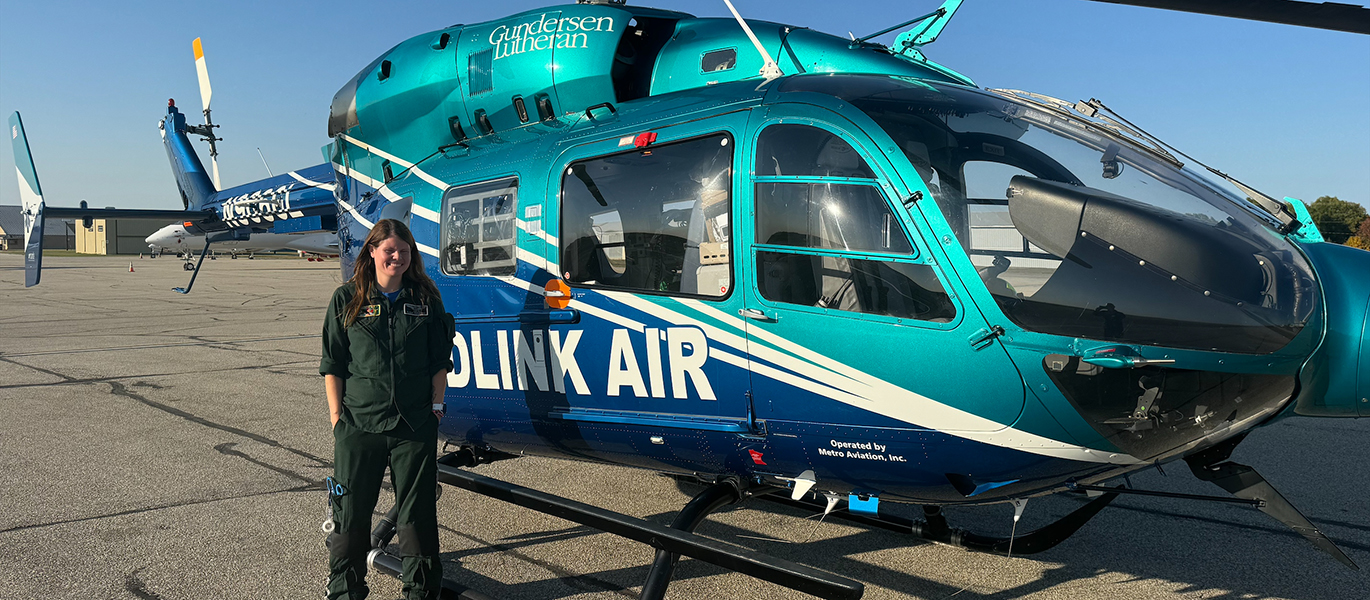
Attending Northeast Iowa Community College summer camps sparked career interest in flight EMS
Thursday, October 10, 2024
Today, Tara works 24-hour shifts as a flight paramedic for GundersenAIR, stationed at an out-based location separate from the hospital.
CALMAR, Iowa–Attending Northeast Iowa Community College’s summer camps for kids in the 1990s forever influenced Tara Kramer’s career future. Tara recalls with amazement the time a helicopter landed on campus as part of a farm safety camp.
As Tara progressed through high school, her interest in becoming a pilot grew and she encountered the world of Emergency Medical Services (EMS). She realized that paramedics could save lives and fly in helicopters to care for patients in emergencies. Tara combined her career interests in aviation and EMS, setting her sights on becoming a flight paramedic.
“As a high school student, I planned to enlist in the military and become a pilot. Instead, I learned that paramedics and nurses could fly in a helicopter. It sparked my interest in healthcare. In my senior year of high school, I completed the EMT-B course at NICC and, after my first ride-along, was hooked into the EMS world. Since that moment, my goal was to fly for GundersenAIR,” Tara said.
Today, Tara works 24-hour shifts as a flight paramedic for GundersenAIR, stationed at an out-based location separate from the hospital. During these shifts, she and her team live in a designated house for the full day, bringing all the food and essentials they might need. The day starts with preparing for the next emergency, which includes thoroughly checking the helicopter to ensure all the equipment, monitors and pumps are working and properly charged. Afterward, Tara and the team meet with the pilot for a briefing, which covers important details like the day's weather conditions and any special events or passengers they may have.
The three-person helicopter crew includes the pilot, a nurse, another nurse, or a paramedic. Once the helicopter is prepared, Tara’s team completes chart reviews and logs the equipment checks. The rest of the day is generally flexible after catching up on emails and finishing any necessary administrative tasks. Since emergencies can happen at any time, they always remain on alert. Tara tries to nap early if possible, as nighttime emergencies can mean being in the air all night. This balance of preparation, staying ready and seizing downtime defines much of Tara’s workday as a flight paramedic.
“The most rewarding thing in this field is making a difference in a person’s life. Usually, we see some really difficult things but sometimes you get follow-up news about a patient you cared for and they are doing well – that makes everything worth it,” Tara said.
Tara believes Northeast Iowa Community College is an invaluable resource for local people, especially because it influences high school students’ academic and career goals.
“I think the best things NICC does for the community is offering these summer camps for kids and collaborating with high schools to allow students to enroll in college courses. I am not sure I would have landed a flight paramedic career without these contributions while I was growing up. I will be forever grateful for the NICC programs that lit a spark in me; they helped me find a successful career I love,” Tara said.
All over Iowa and nationally, communities need skilled paramedics and Emergency Medical Services professionals. Students in the Paramedic and Emergency Medical Technician (EMT) programs at NICC graduate with demonstrated knowledge and skills to provide appropriate patient care for life-threatening emergencies using Advanced Life Support protocol and equipment. An on-campus health simulation lab, fully equipped with an ambulance vehicle, technology, equipment and manikins, trains students for various patient care treatments, medical emergencies and transport. For more information, visit nicc.edu/healthsciences.
